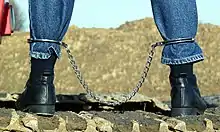бығау
Bashkir

Бығау.
Etymology
From Proto-Turkic *bukagu (“fetter, chain, string”).[1]
Cognate with Old Uyghur [script needed] (boqağu, “fetter”);[2] Kazakh бұғау (būğau), Uzbek boʻgʻov, Turkish bukağı (“fetter, manacle”), Yakut бакаайы (bakaayı, “horse hobble”), Chuvash пӑхав (păh̬av, “iron manacles”), etc.
Pronunciation
- IPA(key): [bɯ̞ˈʁɑw]
- Hyphenation: бы‧ғау
Noun
бығау • (bığaw)
- fetter, shackle, manacle
- (Can we date this quote?), (Please provide the book title or journal name), Mark 5:4:
- Уны әллә нисә тапҡыр тотоп, аяҡ-ҡулына бығау, сылбыр һалғандар, ә ул сылбырҙарҙы өҙгән, бығауҙарҙы ватҡан.
- Unı əllə nisə tapqır totop, ayaq-qulına bığaw, sılbır halğandar, ə ul sılbırźarźı öźgən, bığawźarźı vatqan.
- (They) caught him many times (and) put shackles and chains on his feet and hands, but he tore the chains apart and broke the shackles.
Declension
| singular | plural | |
|---|---|---|
| absolute | бығау (bığaw) | бығауҙар (bığawźar) |
| definite genitive | бығауҙың (bığawźıñ) | бығауҙарҙың (bığawźarźıñ) |
| dative | бығауға (bığawğa) | бығауҙарға (bığawźarğa) |
| definite accusative | бығауҙы (bığawźı) | бығауҙарҙы (bığawźarźı) |
| locative | бығауҙа (bığawźa) | бығауҙарҙа (bığawźarźa) |
| ablative | бығауҙан (bığawźan) | бығауҙарҙан (bığawźarźan) |
References
- Starostin, Sergei, Dybo, Anna, Mudrak, Oleg (2003) “*bukagu”, in Etymological dictionary of the Altaic languages (Handbuch der Orientalistik; VIII.8), Leiden, New York, Köln: E.J. Brill
- Nadeljajev, V. M.; Nasilov, D. M.; Tenišev, E. R.; Ščerbak, A. M., editors (1969), Drevnetjurkskij slovarʹ [Dictionary of Old Turkic] (in Russian), Leningrad: USSR Academy of Sciences, Nauka, page 112
This article is issued from Wiktionary. The text is licensed under Creative Commons - Attribution - Sharealike. Additional terms may apply for the media files.